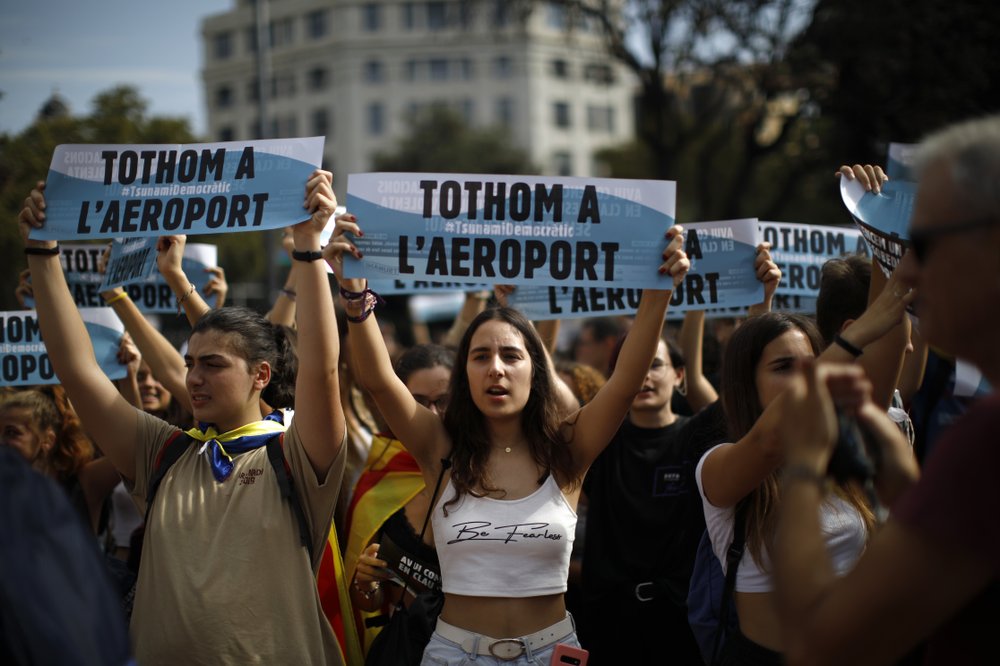
Young people hold up signs in Catalan reading "Everybody to the airport" during protests in Barcelona, Spain, Monday, Oct. 14, 2019. (Photo: AP)
New disruptions to Catalonia’s transportation network on Tuesday followed a night of clashes between activists and police over the conviction of separatist leaders, as Spanish authorities announced an investigation into the group organizing the protests.
Authorities said that three people were arrested and more than 170 others injured, including about 40 police officers and a person who lost an eye, during the clashes well into the early hours of Tuesday between angry protesters and riot police at Barcelona’s international airport and elsewhere across the northeastern Spanish region.
Thousands of passengers were stranded at the airport, with many forced to walk with their luggage on highways and across fields.
The protesters were responding to an online campaign by Tsunami Democratic, a loose, leaderless grassroots group that uses encrypted messaging apps to call for peaceful disobedience.
Spain’s caretaker interior minister, Fernando Grande-Marlaska, said that authorities were investigating the group.
Further protests by separatist groups were scheduled for Tuesday evening.
In a landmark ruling Monday, Spain’s Supreme Court acquitted the Catalan politicians and activists from the more serious crime of rebellion for pushing ahead with a banned referendum on Oct. 1, 2017, and declaring independence based on its results. But judges found nine of them guilty of sedition and handed down prison terms of nine to 13 years. Four of them were additionally convicted of misuse of public funds and three were fined for disobedience.
The court also barred all of them from holding public office. That has an immediate impact in the upcoming Nov. 10 election because six of them were planning to run as candidates to Spain’s parliament.
The verdict is likely to be a central issue in the run up to the vote but “it is unlikely to substantially alter the electoral outlook unless the situation worsens significantly in the region,” said Antonio Barroso, a political risk analyst with the London-based Teneo consulting firm.
He said Catalan separatist politicians wanted to use the backlash against the ruling to woo pro-independence voters to the polls.
Others have feared that swelling support for Catalan separatism because of the convictions could make the next political term even more key to either breaking the deadlock with separatists or making it a chronicle problem. Spain’s caretaker prime minister and Socialist leader Pedro Sánchez, who won the April election, but failed to get support for a minority government, is hoping to remain in office.
But even from the early hours after the 493-page Supreme Court ruling was issued, very different views emerged from Madrid and Catalonia. While Sánchez called for beginning a “new phase” and urged Catalan separatists to abide by the law, the ruling invigorated the wealthy region’s independence movement, with many of its leaders making new calls to work toward effective secession or repeating the slogan “we will do it again.”
Convicted activist Jordi Cuixart told the Associated Press by email via his lawyer that he and the others sentenced by the Supreme Court will take their case to the European Court of Human Rights.
“We have the moral obligation to denounce (Spain’s) authoritarian drift and appeal to European citizens to defend human rights,” Cuixart Tuesday.
The Catalan regional president, Quim Torra, said secessionists won’t give up their fight.
“A referendum is the most positive solution for solving this situation,” he told foreign reporters in Barcelona on Tuesday.
The caretaker Spanish foreign minister, Josep Borrell, soon due to become the European Union’s top diplomat, said the sentence wasn’t resolving the underlying political problems that only dialogue “in the framework of the Constitution” could.
Spain’s constitutional law says that the country is indivisible.
“Yesterday, today and tomorrow it is and remains a political problem that has to be solved,” Borrell told foreign reporters, adding that Catalan separatists shouldn’t ignore Catalans like him who are against independence.
“When one excludes part of the population because they don’t think like one, and only considers as the people those who think like one, this is a totalitarian attitude,” he said.
More protests took place during Tuesday, with on and off blockades of regional roads and railway lines. A three-day student strike begins Wednesday.
Spain’s airport operator, AENA, said that more than 1,000 flights were scheduled to operate normally in Barcelona on Tuesday, with around 20 flights canceled compared to 110 on Monday.
The regional emergency service, SEM, said that 131 people had been treated overnight for injuries, most of them at the airport. Two dozen people were taken to hospitals. One lost sight in an eye, private Spanish news agency Europa Press reported.


